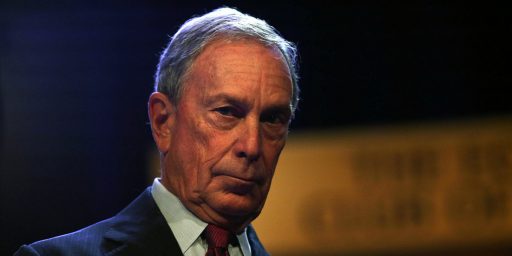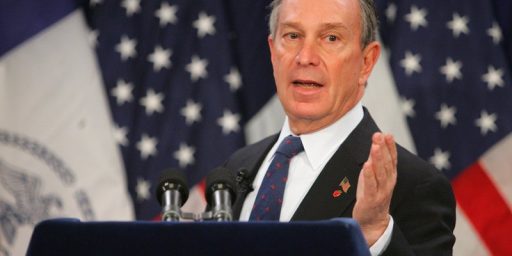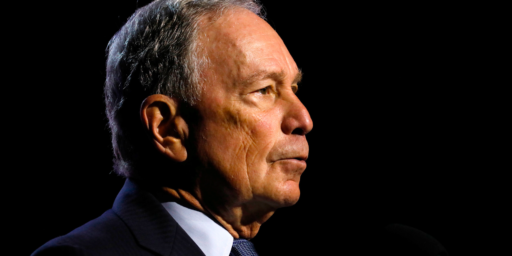Gotham’s Megalomaniacs?
TNR senior editor Michelle Cottle wonders, “What business do [Rudy] Giuliani and [Michael] Bloomberg have running for president?” In addition to finding the former “creepy” and the latter “uninspiring,” she thinks running the Big Apple just doesn’t cut it as preparation for the presidency.
In fact, Rudy’s fundamental New Yorkness seems to be his answer to pretty much everything. When asked at a recent candidate debate about the economic challenges facing the nation, he responded with some glib remark about how if he could tame New York’s budget troubles, he could handle Washington. Get it, everybody? “If I can make it there! I’ll make it anywhere!”
If anything, here disdain for Bloomberg is stronger. She describes him as a “megarich New York mayor with zero foreign policy credentials whose rich friends have somehow convinced him that his bland, middle-of-the-roadness and utter lack of political distinction qualify him to be leader of the free world.”
But president? Come on. Based on what? His national security vision? His deep understanding of the nation’s (rather than the five boroughs’) domestic problems? His stewardship of New York seems to have been fine (he’s certainly impressed The New York Times), but not exactly the stuff of which dynamic national campaigns are made. . . . New York may be the center of the universe. But, September 11 notwithstanding, it’s still several light years away from the heart of America.
While I agree that the leap from leader of a big city to Leader of the Free World is a long one, though, there really is no career path to the presidency that has proven better than others. The Vice Presidency, I suppose, gives the best insights into the demands of the job but plenty of former veeps have gone on to be mediocre presidents; the skill sets required to be effective in those jobs are different. Many great presidents have been former governors; so have many bad ones. Former generals have been a mixed bag. Certainly, the Congress has not proven particularly good preparation. Abraham Lincoln, universally considered one of the very best, had perhaps the thinnest resume: “captain in the Black Hawk War, spent eight years in the Illinois legislature, and rode the circuit of courts for many years.” Plus a failed Senate bid.
Granted, the modern presidency is more complicated than in Lincoln’s day. Still, the abilities to make decisions, communicate effectively in the medium of the day, and manage relations with Congress seem to be the key ingredients to success in the Oval Office. Running the largest, most diverse city in the country is as good a proving ground as any for honing and testing those skills.




Only 11 states have a larger population then New York city. I suspect that if you looked at their budgets you would find the same thing. For example, the New York city population is roughly 2.5 times that of Arkansas. Being mayor of New York should demonstrate an individuals administrative competence and leadership ability as much or more then being governor of most states.
Only the editors of the TNR are ignorant enough to call the mayor of New York “provincial” and make fun of his height, all in the first sentence of a column. This article serves as a reminder of why I no longer subscribe.
The mayor of New York City rivals the governor of New York in terms of power wielded. The mayor governs a city of millions with an organizational structure not unlike the nation’s federal system. The population of the city includes people from all over the country and every nation on Earth who speak every known language. The mayor frequently meets with foreign dignitaries.
I doubt that you could find a better job to prepare for being the president, other than the governor of a large state such as California or Florida.
I agree entirely with the thrust of your post, Dr. Joyner, but have a small quibble:
Lincoln’s presidential qualifications were indeed thin by modern standards. But he was indeed a moderately important figure in Illinois state politics (as a Whig) for several years, and in addition to his tenure in the Illinois state legislature, Lincoln also served one term as a Congressman in the U.S. House of Representatives from 1847-1849, during which he was a noted but ineffective opponent of Pres. Polk and the Mexican-American War. His opinions on that war and, in particular, over the admission of Texas (a slave state) as a consequence of it, have some relevance to his later political development and career. And of course, his debates with Stephen A. Douglas during the course of the 1858 Illinois state election (with Douglas’ U.S. Senate seat re-appointment by the state legislature thereby indirectly also in play) are what brought Lincoln to broader public attention both within and outside of his home state as a rising star within the then-brand-new Republican Party.
I don’t know why being a senator makes one more qualified to run the country than someone who has run a city the size of New York.
What evidence is there that McCain, Clinton, Edwards or any of the other senatorial candidates are capable of holding an executive rather than a legislative office???
So Obama and Clinton have more “experience” and success that Guiliani or Bloomberg?
One was a state Senator in Illinois….period.
The other spent 8 years in the White House with her criminal husband; lots of executive experience there.
If the New Republic article shows anything, it shows the endemic provincialism of that swamp of mediocrity: Washington, DC